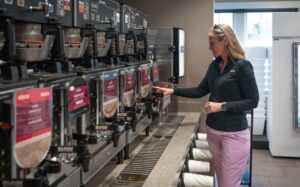PROVINCETOWN — After an eight-hour shift at Tin Pan Alley, Isheka Morgan sits on a bench on MacMillan Pier waiting for the Flex bus to take her home to Eastham. It’s a muggy Tuesday night in late June. Morgan, in her work uniform — a black polo with the restaurant’s logo and black slacks — glances down Ryder Street and checks her phone. A photo of her two sons, 5 and 14, is the screensaver; it’s 10:24 p.m. Her bus was scheduled for 10:05.

An approaching rumble gets Morgan’s attention. “Look!” she says. “It’s here.”
This is the beginning of Morgan’s trip home. Six days a week, she rides the Flex bus from Eastham to her hostessing job in Provincetown and back. Each ride takes an hour, which means she spends 12 hours commuting every week.
The 31-year-old came to the Outer Cape to support her two sons, who live in Jamaica, where she says work is scarce and wages are low. “Some jobs there, you have to work a week to make $5,” she says. “I send money back home to take care of my kids.”

Morgan says the long commute is worth it. “It’s a good job, and I love the people here,” she says. “The town is so open-minded. I’m open-minded. It’s amazing to be in this type of community.”
She shares a home in Eastham with her mother and sister; both work as home health aides in Provincetown. Morgan plans to return to school in the off-season to become a certified nursing assistant, hoping to follow in their footsteps. “I love old people,” she says. “They’re kind and gentle.”
Living in Provincetown would be much better, though. Without the long commute, Morgan says, she would take another job and send more money back home. But finding an affordable place in Provincetown feels like a distant dream. “Even if I could find a place, the rent would be too expensive,” she says.
Many people who work in Provincetown commute from other Cape Cod towns. The housing shortage, driven in part by the conversion of year-round rental units into condos and short-term rentals, means that many workers are priced out of town. The lucky ones find homes up Cape, where prices are at least a little lower.
At 7 a.m. on a Wednesday, Mahrya and Jeremy Selin stop at Cumberland Farms in Wellfleet on their way to their jobs in Provincetown. Mahrya, a dental hygienist, sips iced coffee in her pink scrubs while Jeremy, a general contractor, fills his pickup with gas. The couple usually drive separate cars from their home in Dennis, leaving early in the morning to beat the summer traffic. Occasionally, they’ll rendezvous at a favorite coffee spot.

“We actually met at Cumberland Farms in Provincetown getting coffee,” Mahrya says. “I was like, ‘Who is this really cute guy I keep seeing?’ ” Their encounters eventually led to Jeremy asking Mahrya for her number. They got married last September.
When they decided to buy a home last year, they had to go an hour away from their Provincetown jobs to Dennis to find something affordable. “We looked in Provincetown, and the only thing we could find in our budget was a single-room cinder-block house,” Mahrya says. “It would have been nice to be closer to our jobs, but it just wasn’t possible. We got a good deal on our place in Dennis.”

According to the Cape Cod and Islands Association of Realtors, the median sale price for a single-family home in Provincetown in 2023 was $2,074,000. The median in Dennis in the same year was $650,000.
The newlyweds have different ways of passing the time on the hour-long commute. “I listen to murder mystery books on tape,” says Mahrya. “I’m obsessed with them.” Jeremy says, “I usually listen to Free Beer and Hot Wings,” referring to the morning radio show. “That or ’80s rock.”
They say the long hours on the road cut into their time together. “We’ve talked about taking a class together if we had the time, maybe a Portuguese cooking class,” says Mahrya. They also would enjoy more self-care time: Jeremy would hit the gym more, while Mahrya envisions setting up her pottery wheel and snagging an extra hour of sleep each morning.
For Ann Marie Dobson-Ferguson, purchasing a home also meant leaving Provincetown, where she’s worked since emigrating from Jamaica 15 years ago. Dobson-Ferguson owns Sundaze, a seasonal ice cream shop in the Aquarium Mall, and works as a home health aide in the off-season. Tired of the high prices and the endless rental shuffle in Provincetown and Truro, she decided it was time to buy. “At first, I said I wouldn’t live farther than Orleans,” she says. “That changed quickly once I started looking.”

She found a house in West Yarmouth, where she now lives with her two daughters and husband, all of whom also work in Provincetown. “The house is perfect for us,” she says. “We converted the garage into the master bedroom, so I’m away from all the kids in my little sanctuary.”
Dobson-Ferguson spends 14 hours in the car every week. “I listen to country music and podcasts,” she says. “I like Dateline NBC.” The drive wears her out, though. After closing up the shop, usually around midnight, she says, getting home can be tough. “Sometimes, I’ll take breaks on the way home and rest my eyes,” she says. “When I get to leave early, I’ll go to T.J. Maxx in Orleans. I like to shop.”
After 15 summers working in Provincetown, Dobson-Ferguson says she’d like to work a little less. She envisions a life where she’d finally make it to the beach and spend more time with her kids. “It would be nice to relax for once, you know,” she says. “Enjoy the summer.”
Carol DaLuke is finishing up her day at Seashore Point, where she works as an activities assistant. Born and raised in Provincetown, DaLuke couldn’t find a place to live here, so she rents a room from a childhood friend in Hyannis.

DaLuke spends 11 hours on the road every week, listening to the radio in her Hyundai. Her favorite stations are Classic Vinyl and Willie’s Roadhouse, which plays traditional country music.
While grateful to have a full-time job with benefits, DaLuke wishes she could spend less time on the road and afford to live in the community where she grew up. “If I didn’t have to commute, I would relax more, write more, and who knows, maybe even run for selectwoman.”
DaLuke hopes to get an affordable apartment in the development at the former VFW site when it opens in a couple of years. “If all the planets align, I’d be lucky to get a spot there,” she says. “It seems like the only way you can live here is if you win the lottery, and I don’t think a town can continue to thrive without workers living here.”
